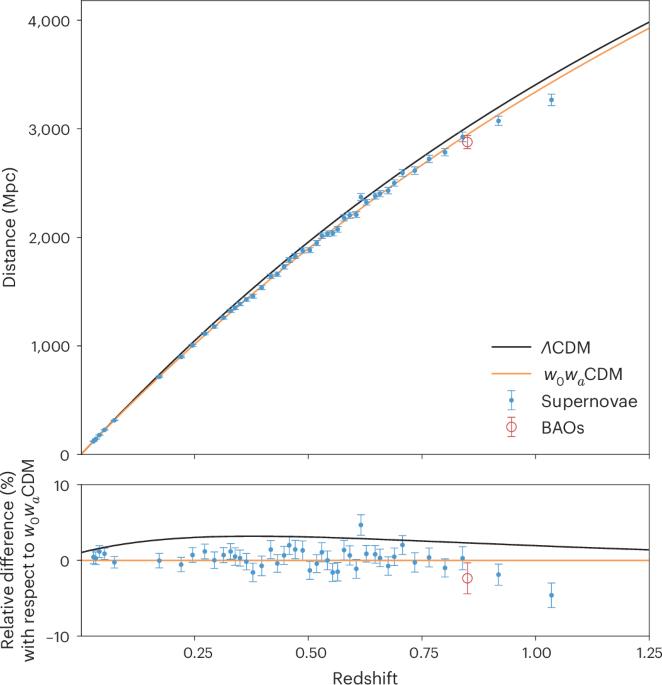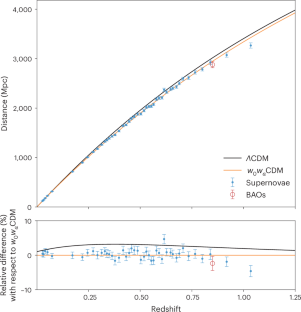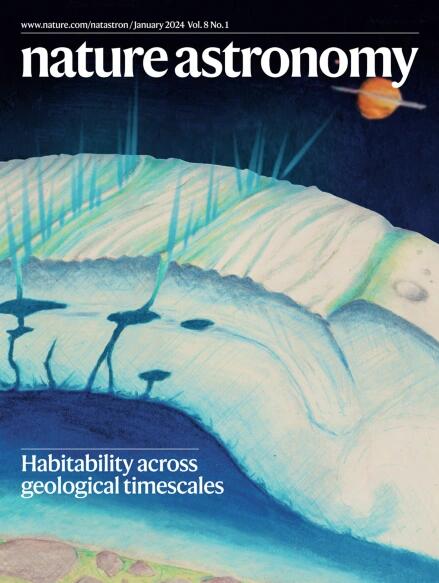Challenges to the cosmological constant model following results from the Dark Energy Survey
IF 14.3
1区 物理与天体物理
Q1 ASTRONOMY & ASTROPHYSICS
引用次数: 0
Abstract
In the past year, several pieces of evidence have pointed to a possible deviation from the standard cosmological model, the Λ cold dark matter model (where Λ is the cosmological constant). The recent work by the Dark Energy Survey collaboration reports a preference in the ballpark of 3σ in favour of dynamical dark energy against the standard cosmological model. For that, it used its final analyses of baryonic acoustic oscillations and type Ia supernovae, both of which are sensitive to the expansion history of the Universe, in combination with the cosmic microwave background from Planck. This adds to the growing debate about the nature of dark energy. Recent results from the Dark Energy Survey add to growing—but still tentative—evidence that dark energy may evolve with time rather than remaining constant. This Perspective presents these tensions and explores their potential implications for cosmology.


暗能量调查结果对宇宙常数模型的挑战
在过去的一年里,一些证据表明可能偏离了标准的宇宙模型,即Λ冷暗物质模型(其中Λ是宇宙常数)。暗能量调查合作项目最近的工作报告说,与标准宇宙学模型相比,动态暗能量更倾向于3σ。为此,它利用了对重子声学振荡和Ia型超新星的最终分析,两者都对宇宙的膨胀历史敏感,并结合了普朗克的宇宙微波背景。这增加了关于暗能量本质的争论。
本文章由计算机程序翻译,如有差异,请以英文原文为准。
求助全文
约1分钟内获得全文
求助全文
来源期刊

Nature Astronomy
Physics and Astronomy-Astronomy and Astrophysics
CiteScore
19.50
自引率
2.80%
发文量
252
期刊介绍:
Nature Astronomy, the oldest science, has played a significant role in the history of Nature. Throughout the years, pioneering discoveries such as the first quasar, exoplanet, and understanding of spiral nebulae have been reported in the journal. With the introduction of Nature Astronomy, the field now receives expanded coverage, welcoming research in astronomy, astrophysics, and planetary science. The primary objective is to encourage closer collaboration among researchers in these related areas.
Similar to other journals under the Nature brand, Nature Astronomy boasts a devoted team of professional editors, ensuring fairness and rigorous peer-review processes. The journal maintains high standards in copy-editing and production, ensuring timely publication and editorial independence.
In addition to original research, Nature Astronomy publishes a wide range of content, including Comments, Reviews, News and Views, Features, and Correspondence. This diverse collection covers various disciplines within astronomy and includes contributions from a diverse range of voices.
 求助内容:
求助内容: 应助结果提醒方式:
应助结果提醒方式:


